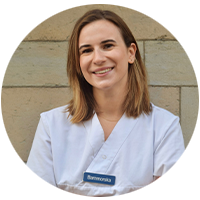Lochia and postpartum bleeding
We're calling our friends at Numa to talk to midwife Ebba Åback. We've collected questions from our customers about the time after childbirth focusing on lochia and menstruation. Here, Ebba provides you with answers to everything you've wondered!
What is lochia really? Do you get lochia regardless of whether you give birth vaginally or by cesarean section?
Lochia is blood from the vagina after childbirth. The blood comes from a wound in the uterus where the placenta was attached and is not affected by the method of delivery. Lochia usually lasts about 6-8 weeks.
Does breastfeeding have any impact on how long you have lochia?
When breastfeeding, a hormone called Oxytocin is released, which helps the uterus contract. For women who breastfeed, the healing of the wound in the uterus is accelerated by the contraction of the uterus! So, healing is somewhat faster for women who breastfeed, and bleeding may therefore last for a shorter period of time.
How long does it usually take to get your period back after childbirth? Is there any difference if you breastfeed or not?
It is individual when menstruation returns. In the first six months, ovulation (and thus menstruation) can be completely inhibited if you breastfeed exclusively. That is, if the baby does not receive anything other than breast milk and breastfeeds around the clock. But the most common is that menstruation returns within 6 months. If you do not breastfeed, menstruation usually returns about 6-8 weeks after childbirth.
I feel that my period has become heavier and the cramps stronger after giving birth. Is that common?
Yes, some people experience changes in their period after giving birth. There are studies showing that 30% of women experience periods of increased menstruation. But for most women, menstruation returns to normal after childbirth.
What happens in the body, why are some people affected by pregnancy/childbirth?
Menstruation may be heavier after pregnancy because the uterus after pregnancy and childbirth is larger. Especially if you do not breastfeed or only partially breastfeed and get your period back quickly.
But there may also be other reasons for heavy bleeding such as fibroids (myomas) in the uterus. If after childbirth you have heavier periods than before, more prolonged, and have to change protection much more often, the recommendation is to see a gynecologist. The gynecologist can then investigate if there is any specific cause for the bleeding, and you can get help if your bleeding is troublesome.
I've heard about ice packs, that it can be comfortable after childbirth. Do I just put a pad in the freezer, or should it be prepared in any way?
You make an ice pack by wetting a cloth pad with water so that it becomes soaked, place it in a small plastic bag/freezer bag, and then put it in the freezer for a few hours. If you feel swollen in the genital area after childbirth, you can then place the pad in your underwear. The cold has a pain-relieving and anti-inflammatory effect. Make sure not to keep the pad in your underwear for too long, maximum 15-20 minutes, to avoid frostbite.
Thank you so much, Ebba, for talking to us! And thanks to Numa - the healthcare app for you who have given birth.
